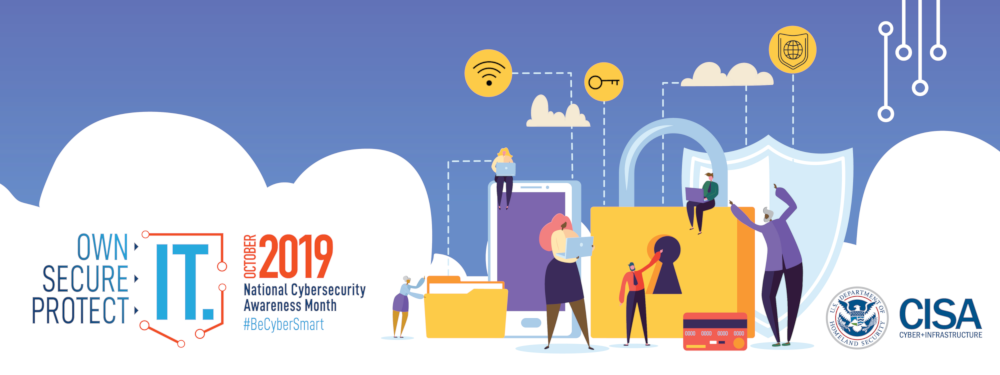
National Cybersecurity Awareness Month 2019
- Posted by Makayla Shaffer
- On October 28, 2019
- 0 Comments
Held every October, National Cybersecurity Awareness Month (NCSAM) is a collaborative effort between government and industry to ensure every American has the resources they need to stay safe and secure online while increasing the resilience of the Nation against cyber threats.
Here are some of their tips about staying secure online:
- Double your login protection. Enable multi-factor authentication (MFA) to ensure that the only person who has access to your account is you. Use it for email, banking, social media, and any other service that requires logging in. If MFA is an option, enable it by using a trusted mobile device, such as your smartphone, an authenticator app, or a secure
token—a small physical device that can hook onto your key ring. - Shake up your password protocol. According to National Institute for Standards and Technology (NIST) guidance, you should consider using the longest password or passphrase permissible. Get creative and customize your standard password for different sites, which can prevent cybercriminals from gaining access to these accounts and protect you in the event of a breach. Use password managers to generate and remember different, complex passwords for each of your accounts.
- If you connect, you must protect. Whether it’s your computer, smartphone, game device, or other network devices, the best defense against viruses and malware is to update to the latest security software, web browser, and operating systems. Sign up for automatic updates, if you can, and protect your devices with antivirus software.
- Play hard to get with strangers. Cybercriminals use phishing tactics, hoping to fool their victims. If you’re unsure who an email is from—even if the details appear accurate— or if the email looks “phishy,” do not respond and do not click on any links or attachments found in that email. When available use the “junk” or “block” option to no longer receive messages from a particular sender
- Never click and tell. Limit what information you post on social media—from personal addresses to where you like to grab coffee. What many people don’t realize is that these seemingly random details are all criminals need to know to target you, your loved ones, and your physical belongings—online and in the physical world. Keep Social Security numbers, account numbers, and passwords private, as well as specific information about yourself, such as your full name, address, birthday, and even vacation plans. Disable location services that allow anyone to see where you are – and where you aren’t – at any given time.
Not sure if your devices are secure? Schedule a consult with SCI today and get peace of mind with our industry-leading security solutions.
Read more: https://niccs.us-cert.gov/sites/default/files/documents/pdf/dhs_ncsam2019_toolkit_508c.pdf?trackDocs=dhs_ncsam2019_toolkit_508c.pdf









0 Comments